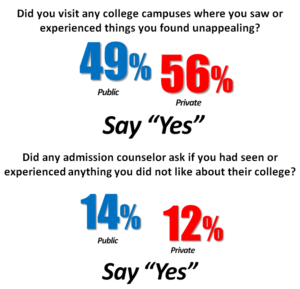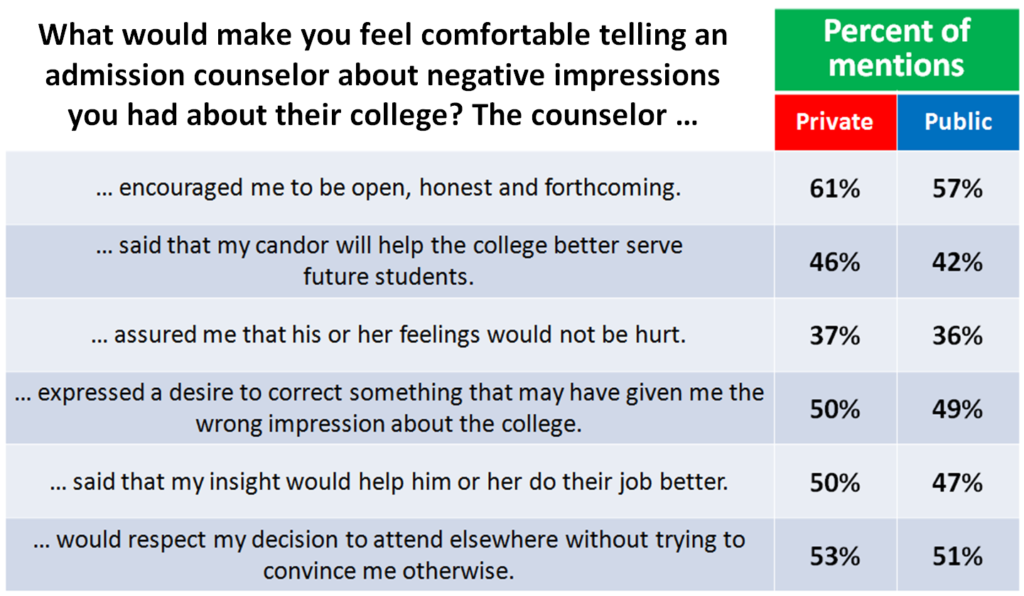We all know that prospective students don’t always tell us what they really think. Sometimes they don’t want to be completely honest about their REAL first-choice college because they think they’ll hurt our feelings. Or, they may tell us they had a great campus visit, yet tell their parents on the way home that they’ll never enroll. They often say one thing and do another.
The fact is: These hidden issues are often deal breakers but, when uncovered and dealt with, they can lead to enrollments.
Admission counselors tell us this “not knowing what a student really thinks and feels” is one of the greatest frustrations they face. So, we joined forces with 36 colleges and universities, private and public, large and small, from all over the United States, to explore this reality in-depth and find solutions. Over 18,000 college-bound students participated in our soon-to-be-released study, “Hidden Influences: Revealing the unspoken perceptions that prospective students have about your college and why it matters in your ability to grow and control enrollment.”
Beginning today and over the course of the next few weeks we will share details from this fascinating study. Today we are sharing strategies and techniques you can use to uncover the things students are holding back. And, by the way, these aren’t strategies we created. These are strategies that prospective students told us will work in revealing their true impressions and feelings.
These discoveries can be used immediately to enable richer, more fruitful conversations with the students you’re trying to recruit.
Half of prospective students visiting a college campus will see and experience things that they find unappealing.
Sure, students are not going to like everything they see at all of the campuses they visit. That’s not news. What’s newsworthy is the finding that colleges are not probing to uncover whether negative impressions exist and, more precisely, WHICH negative impressions may have formed.
On average, only 13% of students say that an admission counselor ever inquired if they had seen or experienced anything the student found unappealing, concerning, or missing about their campus.
After a campus visit prospective students are often asked for their general impressions. We say, “So, how was your tour today?” Or, “What did you think about our campus?” About 70% of students will easily share their positive impressions. Will they so easily share their negative impressions? No. Only about 10% will.
Effective strategies to uncover what students really think.
Prospective students, like most people, are naturally inclined to be kind and keep quiet when they see things they don’t like about our campus. However, 72% of students say they would be comfortable talking about their negative impressions if invited to do so.
In a focus group we conducted with college-bound students in preparation for this study, students identified six things counselors can do or say that would prove effective in getting them to open up and share what they like and dislike the counselor’s college.
The single most effective statement (as identified by 6 in 10 students nationwide) in making them most comfortable involved, “The counselor simply and sincerely encouraging me to be open, honest, and forthcoming.”
Six statements/assurances students suggest that counselors use to get them to open up.
Try it out and see what you uncover!
Here’s how your interaction might play out using one of the assurance statements: “I’m glad you like the campus, especially the stadium/dorms/quad. It’s great, isn’t it? But let me ask, did you see anything that you didn’t like? And don’t worry. You aren’t going to hurt my feelings and it will help me do my job better.” Counselors often hold themselves back from asking penetrating questions because they’re concerned that students will perceive them as being intrusive. That’s so unfortunate. For both the counselor AND the student.
Admission counselors who employ this approach tell us that they are often surprised by the answers they get. A misconception can be corrected or a concern alleviated. Not only do they get a real-time assessment of what the student is feeling, but they frequently uncover the ONE THING that will turn an admitted prospect into an enrolled student. It’s simple, and effective.
We will soon release the complete report of this national study, along with its recommendations for action and new approaches in conversations between admission counselors and prospective students. If you would like an advance copy of the Hidden Influences report CLICK HERE.
We help colleges and universities have better, richer conversations with prospective students to help them grow and shape enrollment. With our yield enhancement programs, interactive training workshops for counselors and other tools, we can help you too. Please call.
Continue the conversation on Twitter @LongmireCo. For more information about Longmire and Company’s Interactive Counselor Training Program, click here. Be sure to Subscribe to Versions of Conversion today so you don’t miss any of this highly-valuable information.

Rick Montgomery is as an Enrollment Strategist at Longmire and Company. With over 20 years in higher education marketing, he brings an innovative and dynamic approach to helping colleges and universities meet their enrollment goals. Rick can be reached at 913/492.1265 x.708 or via email at rmontgomery@longmire-co.com.


 Bob Longmire is President of Longmire and Company, Inc. He is a recognized expert on the topic of how prospective students and parents form their college selection decisions – and how colleges can use that knowledge to grow and control their enrollment. He can be reached at (913) 492-1265, ext 709 or at
Bob Longmire is President of Longmire and Company, Inc. He is a recognized expert on the topic of how prospective students and parents form their college selection decisions – and how colleges can use that knowledge to grow and control their enrollment. He can be reached at (913) 492-1265, ext 709 or at an admission counselor recently asked me. I’ve heard iterations of this question many times: “Why do students say one thing and do another?” We asked over 18,000 college-bound students that very question, and many more.
an admission counselor recently asked me. I’ve heard iterations of this question many times: “Why do students say one thing and do another?” We asked over 18,000 college-bound students that very question, and many more.
 Shifting gears: We are delighted to announce that for a limited time, Longmire and Company’s highly regarded counselor training workshop is coming to a location near you! A number of colleges and universities will be serving as regional host sites where nearby colleges can send counselors to participate in a full-day intensive Yield Season Counselor Training Workshop that will prepare counselors for yield season success. This very affordable workshop is designed to benefit seasoned counselors just as much as counselors who are going through their first full recruiting cycle. Best of all, counselors you send will return home with skills and techniques that can be shared with the whole admission team. For more information or to register today,
Shifting gears: We are delighted to announce that for a limited time, Longmire and Company’s highly regarded counselor training workshop is coming to a location near you! A number of colleges and universities will be serving as regional host sites where nearby colleges can send counselors to participate in a full-day intensive Yield Season Counselor Training Workshop that will prepare counselors for yield season success. This very affordable workshop is designed to benefit seasoned counselors just as much as counselors who are going through their first full recruiting cycle. Best of all, counselors you send will return home with skills and techniques that can be shared with the whole admission team. For more information or to register today,  They tell us they
They tell us they 
